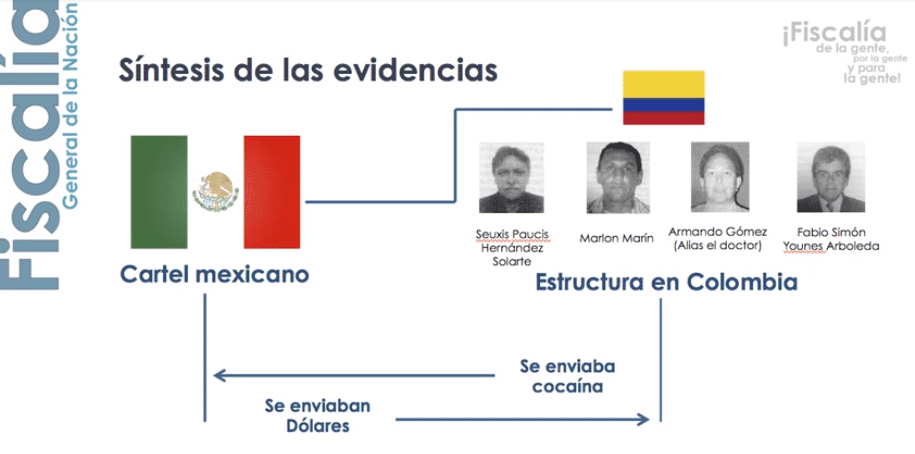The bold arrest of one of the FARC’s top leaders on drug charges has shaken Colombia’s peace process, uncovered ties between a FARC politician and criminalized splinter groups wreaking havoc in the countryside, and may scare more former rebels away from reintegrating themselves in society.
On April 9, Colombian authorities arrested Seuxis Paucis Hernández Solarte, alias “Jesús Santrich,” a top former member of the Revolutionary Armed Forces of Colombia (Fuerzas Armadas Revolucionarias de Colombia – FARC).
The arrest was the product of an INTERPOL arrest warrant based on a US federal indictment unsealed this week that leveled drug charges against Santrich and several associates.
Santrich and three others, all “members and associates” of the FARC, stand accused of conspiring to traffic 10 metric tons of cocaine (worth $200 million in the US market) to the United States. All four are in custody and are wanted for extradition.
During an investigation by the US Drug Enforcement Administration (DEA) and the Justice Department, the suspects claimed to have cocaine laboratories and US-registered airplanes to move the drugs, and provided prospective buyers with cocaine samples.
Santrich apparently sourced drugs from the Urabeños, the National Liberation Army (Ejército de Liberación Nacional – ELN) guerrillas and a violent FARC dissidence led by alias “Guacho” on the Ecuadoran border, Blu Radio reported after consulting Colombian and US investigators. The suspects thought they were working with the Sinaloa Cartel, but the supposed Mexican narcos may actually have been undercover law enforcement agents.*

(Alleged drug trafficking organization involving Santrich and the other defendants. Credit: Colombia Attorney General’s Office)
Santrich is one of the most recognizable faces of the FARC, and was a member of the General Staff and the delegation of negotiators who hammered out a historic 2016 peace agreement, which included amnesty for crimes committed by demobilized FARC fighters prior to the deal. It also protected members from extradition.
Following Santrich’s arrest, President Juan Manuel Santos reaffirmed that he would not extradite any ex-FARC member for old crimes. However, he added, “If, following due process … there is a possibility of extradition for crimes committed after the signing of the peace deal, my hand will not shake as I authorize it.”

(Santos giving a statement following Santrich’s arrest)
According to High Commissioner for Peace Rodrigo Rivera, Santrich can present his case to the transitional justice system created by the peace deal, the Special Jurisdiction for Peace (Jurisdicción Especial para la Paz – JEP), which would decide whether or not the crimes were committed post-agreement. If the JEP rules that Santrich committed the crimes after the signing of the peace accord, that would exempt him from receiving judicial benefits under the terms of the deal.
The peace agreement guaranteed 10 seats in congress for the FARC, now a political party. Prior to the release of the indictment, Santrich was about to assume one of those seats.
The FARC leadership came out in support of Santrich, stating that the arrest had brought the peace process to “its most critical point, and risks becoming a true failure.”
InSight Crime Analysis
The arrest of one of the most visible faces of the FARC will likely have a chilling effect on former fighters who already have doubts about the peace process. This could push more demobilized rebels to join growing dissident criminal groups around the country.
The FARC are painfully aware of their vulnerability on several fronts. Dozens of former rebels have been assassinated in recent months, and authorities are uncovering new FARC money laundering schemes that could also expel members from the peace process.
As InSight Crime has previously pointed out, the threat of extradition to the United States in particular could be a red line for the FARC. Dozens of former rebels — some now dead — have been indicted over the years and could therefore be extradited, including the leadership. This prospect may push many demobilized fighters back into the shadows.
Additionally, Santrich’s alleged contact with a powerful FARC dissidence could raise speculation regarding ties between criminalized rebels and their former commanders. If this is not an isolated event, it would devastate the political ambitions of the group and put even greater scrutiny on funding for the peace process, especially money granted to former FARC fighters.
SEE ALSO: Coverage of FARC Peace
It is hard not to draw comparisons with the surprise extradition of demobilized paramilitary commanders a decade ago. Following a demobilization deal with the government, the top bosses of the United Self-Defense Forces of Colombia (Autodefensas Unidas de Colombia – AUC) were jailed and unexpectedly extradited to the United States in the dead of night, purportedly for continuing to commit crimes. Their deal had also barred extradition, and the move sowed doubts about the government’s commitment to that agreement.
While Santrich’s pending extradition is also likely to shake confidence in the government’s commitments, this news is just the latest in a series of recent blows to the legitimacy of the FARC peace deal. Authorities have discovered a kickback scheme related to peace deal contracts, a top transitional justice official has resigned, and many coca farmers are on the fence about withdrawing support for the accord.
Events that delegitimize both the deal and the FARC party are likely to give momentum to the political opposition in the final weeks leading up to presidential elections. Right-wing candidate Iván Duque has already promised “structural changes” to the peace deal, including the peace courts, if he is elected.
* An earlier version of this article incorrectly stated that Santrich and his group were accused of working with the Sinaloa Cartel. In fact, the supposed cartel members may have been undercover agents.

